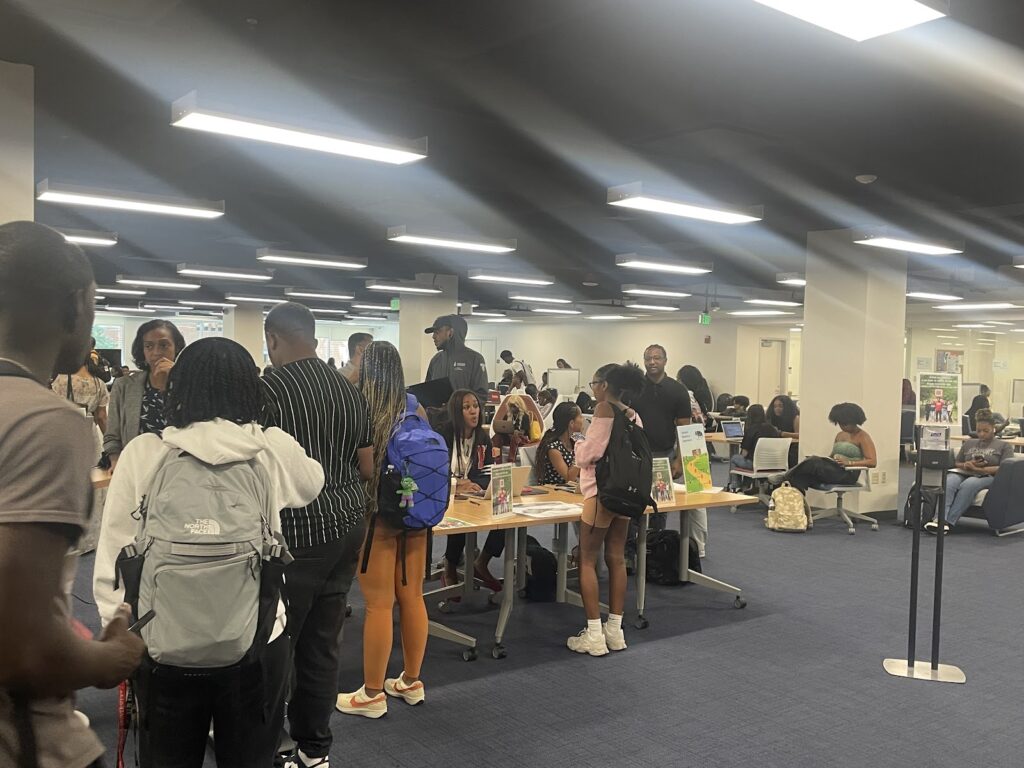
Many students reported last week that their class schedules displayed on BisonHub were incomplete, some with missing professors and classroom assignments. Students voiced that this left them unsure of whom to contact to attend these classes.
Emmanuel Perry, a freshman political science major from Plainfield, New Jersey, who enrolled in POLS 010 – National Government of the United States, said he did not have a professor listed for his course and only received an update via email on Tuesday, Aug. 20.
Some students, like Garrison Andrews, a freshman political science major from Stone Mountain, Georgia, also noticed a professor missing and the meeting time being changed for a course he registered for. However, Andrews said the issue was quickly resolved before the first day of classes.
Unlike Andrews, students like Sanaiya Hammond, a junior math major from Long Beach, California, didn’t receive a solution for her missing professor until Thursday, Aug. 22, after visiting the Solutions Hub in the Wayne A.I. Frederick Undergraduate Library three times. On her third visit, Hammond had to come when the Solutions Hub opened at 9 a.m. from Vie Towers.
“It’s been a little back and forth. I think that not all the information being from BisonHub is extremely confusing,” she said.
Dr. Tashni-Ann Dubroy, the executive vice president and chief operating officer, said that BisonHub, which is an element of Howard’s IT infrastructure that she oversees, is not the cause of class and professor assignment issues.
“Some of the problems that our students are facing, for example, when they’re saying ‘we don’t see professors in the system,’ that’s not a Workday problem,” she said.
BisonHub, as Dubroy explained, “only acts as a mirror reflecting what’s being put in.”
In addition to Workday, Coursedog, an academic operations platform, is an added application that allows schools to input course information such as classroom assignments, professor information and course information. According to Dr. Dubroy, this is information that must be manually inputted by department chairs within each of the colleges.
Dean Rubin Patterson is the dean of the College of Arts and Sciences and also a temporary professor of SOCI 199: Environmental Inequality due to the class professor still being onboarded.
According to Patterson, due to the high number of students accepted, the departments had to accommodate by hiring “efficient” and “well-versed professors and lecturers” to accommodate the rise in students for the fall semester.
The process includes a potential candidate getting reviews from the college’s department chair and the provost’s office. Once approved, the candidate then has to go through the college’s human resources department.
“These various offices are working judiciously to get it done as soon as possible,” he said.
Patterson attributes this process as part of the reason why some professors aren’t yet available to teach for the fall 2024 semester.
Amid waiting for professors to be onboarded, many advisors and university administrators stepped in to provide support. Students often expressed appreciation for the time and effort advisors, professors and faculty dedicated to resolving their different situations.
Ryan Hall, an academic advisor in the school of communications, starts his day at 9 a.m. and finds himself on the third floor of the MET Building until 5 p.m., mainly assisting students with questions and concerns regarding their classes.
“With any new interface, there’s going to be some challenges and a lot of glitches, you know, that can and will occur,” he said.
The Hilltop sought to interview advisors about their experience assisting students during this period, but many said they were too occupied to speak, given the surge in student visits. Those able to comment reported seeing more than 400 student visits per day, a number that includes repeat visits from students seeking further assistance.
Courtney Taylor Porter, director of enrollment management events, was a part of the team of faculty members being “the front-facing person that tries to troubleshoot things” and who “make sure that people are going to the correct desk that they need help with.”
“I’m really proud of the students for being proactive,” Taylor Porter said. “ On our biggest day, I think we saw about 700. The Solutions Hub is working and it is needed. We’re just sincerely glad to help the students get the answers that they need all in one place.”
Taylor Porter’s reflection on the Solutions Hub and the comments from students and faculty highlight the Solutions Hub’s success. Patterson looks ahead to future improvements, emphasizing the need for more changes, management and a more streamlined process.
“We really want to have more change management, such that we have far, far less of this for fall ’24 and in the future,” Patterson said.
In addition to change management, the dean also wants to ensure that the process of solidifying classes for future semesters can get started as soon as possible. This would occur by “knowing the size of the [incoming] class,” which in turn would allow the “appointment [of] faculty members by the summer.”
Course and registration data available on BisonHub can help students who need to review their schedules.
Copy edited by Jalyn Lovelady







